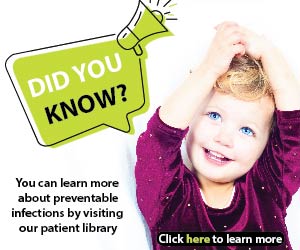The great outdoors: Safety first against its foes

Ahh, the great outdoors! What better way to soak up the sun, get some physical activity in, and breathe the fresh air? While the benefits far outweigh the risks, there are some preventative measures you can rely on to stay safe before even stepping outside.
Tetanus
Tetanus is a bacterial infection that can be transmitted to people through contaminated soil when it encounters open cuts.1 Those who aren’t immunized against it could experience severe symptoms for which there is no cure. In 20% of cases, it could even be lethal. Immunization is currently the only way to remain safe from this disease.2 So, whether you’re gardening or enjoying a sunny day of yard work, keep yourself protected from unwanted infection by wearing the proper footwear and gloves.
The tetanus vaccine is typically provided for free for Canadians. This isn’t a get-it-and-forget-it kind of immunization, though, so make sure you follow the recommended vaccine schedule below:
- Children: Immunization is given in small doses at 2, 4, and then 6 months, with a booster dose between 4 and 6 years of age.3
- Teenagers and adults: It is recommended that they seek preventative immunization through boosters delivered every 10 years.
Lyme disease & mosquito-borne illnesses
Lyme disease can infect humans and their pets through the bites of ticks.4 Once they latch onto the skin, it’s difficult for people to even spot, with them being somewhere between the size of a poppy seed and a sesame seed. As a result, many people become infected without ever knowing they’d been bitten. Keep a keen eye on your furry companions to make sure they aren’t bringing any unwanted guests home that can put you further at risk, too.
Since there is still no cure for Lyme disease, there are preventative steps you can take. Before going into green areas like public parks or forests, tuck your shirt into your pants and your pants into your socks to limit skin exposure.5 Stick to cleared paths and avoid patches of grass and plants where ticks like to hang out. Make sure you’re sporting close-toed shoes and apply insect repellant as needed. Check out this cross-Canada map which features the areas which are most likely to expose you to tick bite risk.
Given the increasingly warming climate and instances of rainfall at home and abroad, Canadians have seen an increase in cases typically reserved for hotter, damper climates, like the West Nile virus.6 Cover exposed skin, use insect repellant and check out our mosquito resources page.
Rabies
Rabies is a contagious infection that can be transmitted when the saliva of an infected animal comes in contact with your eyes, nose or mouth, or open cuts (either existing or caused by a bite or scratch).7 If you’ve been exposed, you’re going to want to work quickly on this one: clean the wound immediately with soap and water for 10 to 15 minutes and make an appointment to see your doctor as soon as possible for a rabies vaccination.
Adopt safe habits like keeping your hands to yourself near wild animals (no matter how cute they are), getting your domestic animals vaccinated against rabies if they tend to venture outdoors, and seeking help immediately if you ever suspect being at risk.
COVID boosters
As of February 2024, the COVID positivity test rate was still hovering somewhere around the 10% mark, likely underrepresented due to plummeting policies in testing.8 Make sure you stay up to date with your COVID booster vaccination schedule.9
When it comes to outdoor safety, prevention is key
Open wound illnesses, bug bites, and respiratory infections, oh my! These risks aren’t worth locking your doors and isolating, though. With the right preventative steps under your belt, you can enjoy the outdoors the way they should be and fill your cup with Mother Nature’s own healing properties: spiritual peace, mental calmness, and restored energy levels.
If you want to know more about outdoor risks and their corresponding prevention and immunization, visit our Outdoor Safety page and find a vaccination clinic near you.
Brought to you by Vaccines411.ca - know where to go for your vaccinations.
This information should not be used as a substitute for the medical care and advice of your doctor. There may be variations in treatment that your physician may recommend based on individual facts and circumstances.
Read more Vaccines411® Articles 
Sources
Note: the hyperlinks that direct to other sites are not continuously updated. It is possible that some links become untraceable over time. Thank you.
- Tetanus.
https://myhealth.alberta.ca/topic/Immunization/Pages/tetanus.aspx - Tetanus vaccine.
https://immunizebc.ca/vaccines-by-disease/tetanus#:~:text=Tetanus%20vaccination%20is%20recommended%20for,months%20and%204%2D6%20years. - Tetanus: Health Professionals.
https://www.canada.ca/en/public-health/services/immunization/vaccine-preventable-diseases/tetanus/health-professionals.html. - Lyme disease transmission.
https://www.cdc.gov/lyme/transmission/index.html#:~:text=There%20is%20no%20credible%20evidence,Rocky%20Mountain%20wood%20tick%20(D. - Lyme disease: Prevention and risks.
https://www.canada.ca/en/public-health/services/diseases/lyme-disease/prevention-lyme-disease.html - Fight the bite: Mosquito borne diseases are on the rise in Canada.
https://science.gc.ca/site/science/en/blogs/science-health/fight-bite-mosquito-borne-diseases-are-rise-canada - About Rabies.
https://santemontreal.qc.ca/en/public/stay-healthy-this-summer/bites-and-scratches-beware-of-rabies/#:~:text=Depending%20on%20the%20assessment%20of,effective%20way%20to%20prevent%20rabies. - COVID-19 epidemiology update: Summary.
https://health-infobase.canada.ca/covid-19/ - COVID-19: Prevention and risks.
https://www.canada.ca/en/public-health/services/diseases/2019-novel-coronavirus-infection/prevention-risks.html



